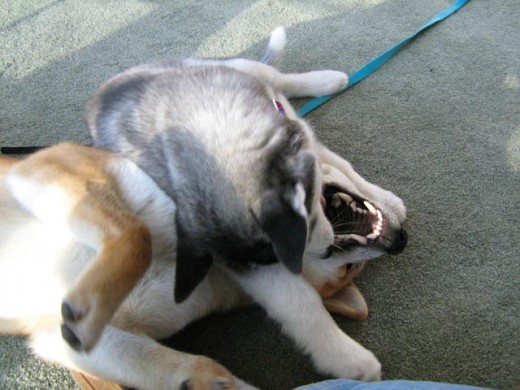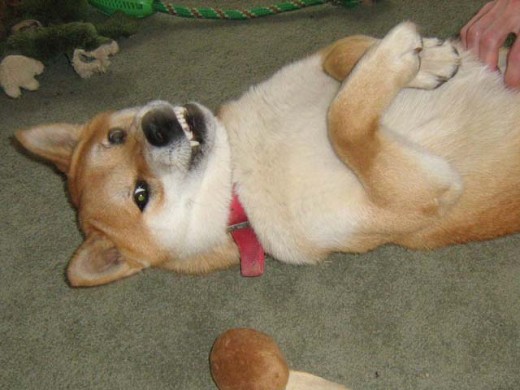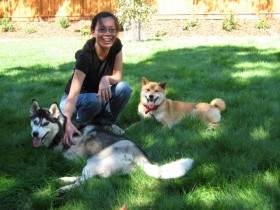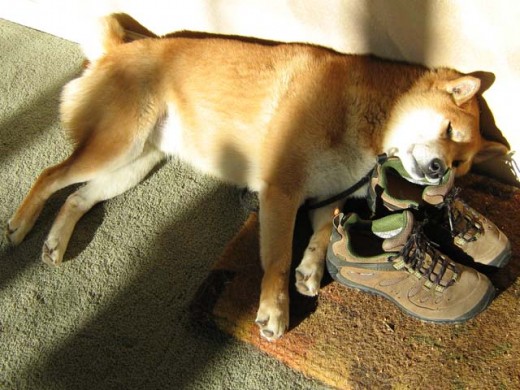Why do puppies bite?
Unlike us, puppies do not have opposable thumbs, so they manipulate stuff with their mouths, in the same way that we manipulate stuff with our hands. New puppies or young dogs will try to put everything into their mouths, because they are curious about objects and their surroundings.
Therefore, puppy biting is normal canine behavior.
Puppies also play with each other through play-biting. When a puppy bites too hard during play, his siblings may yelp and stop interacting for a short duration. Biting too hard on an adult dog (e.g. their mother), may also result in an undesirable consequence. In this way, puppies learn social rules and boundaries.

There is nothing wrong with dogs or puppies biting each other during play, but it is crucial to teach them to be careful with their mouths when interacting with people.
A puppy who is not taught this lesson, may become a danger to all the people around him, including his owners. Play-biting with humans, especially seniors and children, may cause accidental injuries and ultimately result in forced euthanasia.
If our puppy is biting us or others in an uncontrolled way, it is best for everyone not to engage in rough play with him. Also, do not play games that encourage biting such as Tug-of-War.

How to Deal with Puppy Biting
I deal with puppy biting by training my dog in three important areas –
1. Bite inhibition training
People have thinner and more sensitive skins than dogs do. Therefore, one of the first things that I teach my puppy is to control the force of his bites, especially when interacting with me and others.
2. Redirection and no-bite conditioning
When my dog bites on people, clothing, or unsanctioned objects (e.g. books, wires), I no-mark to let him know that it is an undesirable behavior. Then, I redirect his mouth onto something acceptable, and reward him for doing the right thing. In this way, he learns which objects are off-limits, as well as what he should do instead.
3. Excitement and self-control
An over-excited puppy, who lacks self-control, will tend to bite more often and with greater force. By managing my puppy’s excitement level and teaching him to control his impulses, I set him up for success, and reduce the number of instances where he engages in bad biting behavior.
An ounce of prevention is worth a pound of cure.
~~[Benjamin Franklin]
When dealing with puppy biting issues, I always try to stay calm but firm. I do my best to catch problems early on, and fix them before they escalate in degree and frequency.
If a dog is causing puncture wounds, or escalating his aggressive biting behavior, it is best to get professional help as soon as possible.
In this article, I discuss bite inhibition training and no-bite conditioning. For more on managing a puppy’s excitement level, please refer to Managing Puppy Excitement and Self-Control.
Bite Inhibition


Some dogs may have low bite thresholds. This means that they resort to biting or aggression even with fairly low, seemingly harmless stimuli.
One of my dogs, a Shiba Inu, can get mouthy when he is excited or frustrated, when I restrain him, when I stop him from doing something, and much more. Because of this, it is extremely important to train him to have good bite inhibition.
I start bite inhibition exercises as soon as I bring a puppy home. Even though puppy teeth are sharp, a puppy does not have the jaw strength of an adult, and is not capable of doing as much damage. Once my puppy has a soft mouth, I train him to stop biting on people.
Hand-feeding is a good way to teach our puppies to control the force of their bites. I hand-feed my puppy at least some of his kibble every day. If he bites too hard when getting his food, I do a sharp ouch or yelp, and ignore him for a few seconds. This teaches him that if he bites too hard, the food stops.
If my puppy is taking food from me gently, I praise him and keep the food coming. Often, I will combine hand-feeding with puppy obedience training and dog grooming sessions. Hand-feeding can also help prevent food aggression issues, so I continue this practice throughout my dog’s life.
We can also get Ian Dunbar’s book After You Get Your Puppy, for an overview of bite inhibition training.
Initially, Dunbar may come across as somewhat alarmist. We may feel that if we do not meet his somewhat unrealistic dog socialization and puppy training demands, things are going to go badly. I just try to ignore the alarmist talk, and focus on the bite inhibition and handling exercises, which are quite useful.
I am very thankful that my puppy (now adult dog) has a soft mouth. Because my Shiba Inu has good bite inhibition, we were able to solve many of his subsequent issues, which would have been difficult to deal with if he were biting at full strength.

When Our Puppy Bites …
When our puppy bites, it is important NOT to jerk our hand away. If we jerk away, we will likely get scratched. In addition, sudden and quick movements may make our puppy think that it is a fun game. This rewards the biting behavior, and encourages him to bite on us even more.
In the worst case, quick movements can activate a dog’s prey drive, and encourage aggressive behaviors. Therefore, it is important to control this reflex action, and stay still. In addition, I give a no-mark or yelp as a puppy might do to his litter-mates, when they are playing too rough.
I usually yelp when it is an accidental dog bite, for example when my dog gets his teeth on me while taking food out of my hand. Yelping is also appropriate for puppies that are still learning the rules. Otherwise, I use No for adult and adolescent dogs, who should know better.
After the no-mark, I always follow-up with a positive command, e.g. redirect him onto a toy.

1. Redirect Our Puppy onto a Toy

This technique is especially useful for an untrained puppy. It lets him know that it is ok to bite on a toy, but not ok to bite on people.
For example, my dog gets excited and starts biting when I scratch his tummy. Therefore, I used that as a training exercise to get him to bite on a toy, instead of on my hand. Since I can start the exercise anytime I want, I control the environment and make sure that I have multiple soft toys nearby for use. I make sure to reward my dog very well with food and affection when he redirects, so that I further reinforce the behavior.
A toy can also be useful for those cases where the puppy is losing control, and getting a bit too excited or frustrated. Giving him something to redirect his excitement or frustration at, may help to calm him down.
If I do not have a toy handy, I can also redirect by giving my puppy an alternate and simple command that he knows very well, e.g. Sit.

2. Withdraw Attention and Affection
Often, a puppy starts to bite at us because he wants to play or interact. Therefore, if my puppy does not respond to my redirect, then I withdraw my attention and affection. I do this by standing up, folding up my arms, and ignoring him. I make sure not to give any eye contact, not to talk, and not to engage him in any other way.
This is also called a timeout lite.
By doing this, my puppy learns that-
Out of control biting and jumping = No play, no attention, and no affection,
Gentle interaction = Play continues, food rewards, and extra attention.
Sometimes, my puppy may get too excited and escalate his behavior by biting on feet, or jumping and trying to bite on clothing. This is something that I absolutely do not allow because it can be very dangerous, especially with children and the elderly.
If my puppy escalates his behavior, I no-mark, say “Timeout”, and take him to a low stimulus timeout area immediately.
NOTE – In general, I try to set my dog up for success by managing his excitement level. In this way, I keep timeout-necessary episodes to a minimum.
3. Timeout

Most dogs value their freedom to roam around the house and backyard. Dogs are also pack animals, and like being with both human and canine members of the family. Since a timeout takes away both of these things, it is an extremely effective method of dog discipline.
When giving my dog a timeout –
- I make sure to put him in a really boring room, with no windows that he can reach. Currently, my dog’s timeout area is the laundry room.
- I check that the room is safe, and contains nothing that he can chew, play, or interact with in any way.
- Finally, I ensure that nobody gives puppy any attention during his timeout period.
It is better not to use a crate for timeouts. Crates are useful for transportation, management, and more. Therefore, I ensure that the crate is a happy place, where my dog feels comfortable going to for some peace and quiet, for sleep, and to chew on his favorite toy.
I find that a timeout is the most effective way to stop my dogs from biting. However, I only use it when my puppy is deliberately acting out, and not for accidental bites.
Initially, I start with a short 1 minute timeout. If my dog continues to bite right after he comes out, I return him to the laundry room for a much longer period of time (about 15 minutes). Be flexible with the timeout duration, and adjust it according to our dog’s age, temperament, and behavior. Some trainers do not believe in long timeouts, while others may ignore their dogs (timeout lite) for hours.
Do not use timeouts for training mistakes or lack of motivation.

How to Stop Puppy Biting
Some trainers suggest using aversive techniques to stop dog biting. For example, one suggested making my hand into a fist (so my fingers are safe), and then pushing my fist gently in when my puppy bites. This is uncomfortable for the puppy, and he will likely release our hand.
While it did get my puppy to release my hand, it did not reduce his biting behavior. In fact, my dog responds badly to any aversive methods. Doing this made him want to bite on me even more, because he got a reaction, and now has something (my fist) to fight with.
The same thing occurred with spraying water on his muzzle; he just started attacking the water bottle.
Ultimately, aversive techniques were not very effective with my dog, and caused even more behavioral issues. With aversive methods, it is difficult to trick a puppy into thinking that the bad stimulus is not coming from us. This can compromise a puppy’s trust and weaken our bond with him.
Instead, when my puppy bites,
- I first use a no-mark, for example, No or Ack-Ack to let him know that it is an undesirable behavior.
- Then, I redirect him onto a toy or give him an alternate command, for example Sit. If he stops biting and follows the command, then I praise him and reward him with attention and a fun game.
- If he continues to bite, I start with a timeout-lite by first withdrawing my attention. I do this by standing up, folding my arms, and turning away from him.
- If he escalates his behavior and starts to jump or bite on my clothing, then I quickly remove him to his full timeout area.
I always try to set my dog up for success by managing his excitement level. When he starts biting, I try to redirect and turn things into a positive learning experience. I only escalate my response when I absolutely have to, and I try my best to minimize those instances.

How do I get my adult shiba to stop biting? I have a two year old shiba, and he won’t stop biting me whenever I try to play with him or give him food. I adopted him when he was one, so I couldn’t train him as a puppy.
I have a 7 mo old shiba puppy who gets very mouthy when excited. I have worked diligently to teach her bite inhibition and with me she does well. When I have guests however, she doesn’t do well. She is very reactive (excited) and gets mouthy. I’ve tried to tell my guests to ignore her, to no avail. They get excited at seeing her (very cute, awww a puppy, etc, etc.) How do I get her under control?
Hi there! I just have a question on the timeout method. My 3 months old puppy has a nipping problem and has a bad bite inhibition (she would break superficial skin). I have been using timeout as saying ouch or yelping does not seem to be working. The timeout seem to be working but I do have a question. We play with our puppy in the living room (just the living room) and I use the crate (I know… I shouldnt be using her crate… im gonna buy a small play pen) for timeout which is in my room upstairs. Whenever she bites, I would carry her and go upstairs and put her on the crate. I just say “timeout.. no biting.” nothing more. Is carrying her upstairs a good idea or should I bring the crate downstairs?
Hello I meant to say He is a 2 yr old Shiba-inu !!
Sorry for that mistake.. He was born with 3 legs and a 1/2 stump leg, and was unable to starch like other dogs to go out…To break the habit of his jumping up and biting me every time he has to go outside ..so I was trying a technique of just trying to get him to stop jumping on me but that’s not working , because of the biting so as I’m doing that he’s biting me harder . He likes to bark I suppose we have taught him to do so because of his disability however the barking is lessening because I ignore him on certain Barks that I know are just out of fear and attention to just be verbal .. I don’t want to ignore his notion of wanting to go outside to potty but I need to figure out a way to redirect the barking and biting and letting me know .. I thought about using a bell that is tied to the door and trying to retrain him to use his nose to ring the bell and I think that’s what we should’ve done to begin with.
Thanks for any suggestions
Hello, I have a two-year-old Sheeba in you he’s a beautiful boy and he’s a good boy he listens and he’s well-trained however he has a disability, he was born with only three legs and a half stump on the fourth leg .. When he was younger my daughter and I made the mistake in teaching him instead of scratching on the door to come in and out and go to the bathroom outside like the other dogs he would just bark at the door and that seem to work but lately he jumps and bites on us really hard in order to go out and I can’t seem to get him to stop .. So now as I walk around my own house he’ll run at me and bite me until I let them out and that could mean biting me until I could get to the door , it’s gotten bad..
Any advice on how to break this horrible habit ?
I have a 12 week old little boy Husky (Kid Cowboy) and a 12 year old Husky (Elvis). Elvis has been spoiled his entire life. He has weak legs so he is not too pleased when the puppy is super energized and wants to play, how can I get the puppy to play nice with Elvis, or can I? Also, Elvis is very possessive of his food, he does not share, never has. Right now I have to feed them separately, can I teach them to share? Thank you
Hi,
I have a 11 weeks German Shepard. She love to play and as a part of playing she is doing a lot of play biting. She takes our hand in our mouth and when try to get up she eats our feets and grabs the lowers. We have tried doing the Ouch thing but didnt work. So we started doing redirect, it worked for some time and now she is back to more biting. We give toys in her mouth.
I play with her with the toys and I usually do tug of war with her. Give the toy and dont let her take it easily, but eventually I give her the toy. Maybe this thing lead to this biting thing?
When we are sitting on carpet, she is playing with some toy, she suddenly comes toward us and starts biting. She is getting super excited and she runs and comes back bites and runs. She think it is a game.
Now I have started to place thumb in her mouth with finger on the chin. I just started this method(June 23). I say NO BITING and keep the finger for 15-20 seconds. She whines a bit and tries to bite but slowly gets normal. When we take the hand out she starts biting again. We again do the same process.
Any suggestions on how to stop her biting?
Also she is so full of energy. We take her out in lawn and she eats grass and soil. In the home she runs around play and like to bite.. How can we burn her energy and make her tired without making her run and walk for a long time period? Should we take her out on leash in the lawn?
This is Our first dog and we are doing our best to make her learn.
my 10 week old Pit Bull is doing the exact same thing and I am at a loss! I would love some tips! If I redirect with treats he just aggressively bites at me for the treat, he does not redirect with toys.
I got a puppy who looks like a chihuahua but is way bigger than any ones chihuahua I have ever seen. I tell people he is a chihuahua something but someone mentioned that he looks like a Shiba so I looked online and I think he is some of the pictures look just like him.
That being said, I have kept a lot of the behaviors on here under control. Pig skin bones, or soft hide, we call them his chews. I always have them around. When I’m watching TV or something and don’t want to play I tell him to get his chew and he picks one and chews it. I have many toys in a few baskets that I bring out and mix up so he doesn’t get bored. I have scavenger hunts with some of his food hidden all over and tell him to find it. When he finds things in the yard, eg pine cones, he brings them to me and I thank him and make him think he did something good and give him something in return for bringing it back. My mother in law says that I’m his playmate and not the alpha, but he obeys and does what I want because he gets something in return. He knows most commands, and he’s 9 months, does them for me without problem, but anyone else and he decides if he wants to obey.
So, my suggestion is not to make things about dominance necessarily, because a lot of the more intelligent dogs seem to respond best, when young if they get rewarded with fun and play. I put the toy in timeout, like it’s the toys fault, at first, then he gets timeout. I keep his leash on him most of time, and catch it when he isn’t obeying.
The thing that I have the most problem with is barking. When he doesn’t know what a noise is, he thinks he needs to tell everyone that there is a problem, and barks. But when we go investigate the sound, and I say it’s ok, he stops and ignore it. For example, the neighbor was shoveling the snow in front, we r in an apartment, and when he barked, we went outside to see what it was, he didn’t like the shovel at first, but we ended up helping the guy and when I shoveled for a lil (and he thought he helped with the pile) it wasnt Scarry anymore and he didn’t bark or care any time after that. So sometimes it helps them to know what that noise is.
My neighbors are ok with his occasional outburst tho because they have a chihuahua that barks at everything and they started showing her things went a big deal she got a bit better.
Hope maybe this helps someone and good luck.
Thank you for all the great advice and wonderful article. I am going to try and use some of the practices you recommended. If you could also give me some other advise on what I should do about my roommate’s Shiba. So, I just moved in to a new apartment with my roommate and ever since we moved in her Shiba, Goshi, will follow me around and then leap bite me. Other times Goshi will just stare me down; and other times he will just be normal to me. I have spent time with Goshi before me moved in and he does everything i mentioned above weather she is there or not. Please help.
I have a 10week old golden retriever puppy. We don’t play tug of war or anything that would encourage aggressive behaviour but she won’t stop nippin me which is getting harder and harder. It’s quiet upsetting. I am trying time outs of 2 minutes. After the first time out she comes back rearing for more. After the second timeout sometimes she just ignores me and walks past even though I try to praise her. Other times she’s still rearing to go. She sees it as a punishment instead of a lesson. I have tried ignoring her but she just keeps coming back at me. I have tried the ‘no’ it worked once. I have tried distracting her with a toy and praise her that had also been unsuccessful…… Please help.
I took my puppy from a dog foster home about a year ago. I love him to bits; he has a great personality, and I feel that he loves our family so much. BUT, he bites a lot. How to stop it?
My husband and I were thinking about taking him to ‘doggy school’, but then again, it’s extremely expensive, and the nearest ‘doggy school’ is far away from us. Maybe you have some advice? THANK YOU!!!!